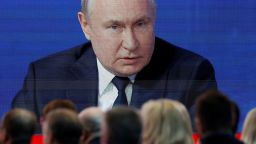Editor’s Note: Ruth?Ben-Ghiat is a professor of history at New York University.?She is author of the book “Strongmen: Mussolini to the Present,” and she publishes?Lucid, a Substack newsletter about threats to democracy. The views expressed in this commentary are her own. View?more opinion?on CNN.
Vladimir Putin, Recep Tayyip Erdogan, Viktor Orban, Adolf Hitler, Xi Jinping, Kim Jong-un, Saddam Hussein: What do they have in common? All of these authoritarians have reportedly drawn praise?from?former US president — and now?GOP presidential nominee?—?Donald Trump, who has promised Americans that he, too, will be a dictator “on Day One” of his time in office.

This is not just bluster. As a new?book?by CNN anchor and national security correspondent Jim Sciutto reminds us, Trump allegedly believes that even the most murderous dictators,?such as Hitler, did good things. According to one of Trump’s former chiefs of staff, Trump had?Hitler in mind?as an example of leadership to emulate during his time in the White House, including?telling?the military?what to do?as commander in chief.
Given the stakes for our democracy?in the 2024 election, it’s worth considering why Trump continually praises dictators and who he is trying to reach with this kind of talk. Some of it is no doubt Trump airing his fantasies of the kind of authority he?could?exert as president. He praises Hitler, Chinese leader Xi, Russian President Putin and others?because?of their absolute power, not in spite of it. He repeats these leaders’ cult of personality propaganda in presenting them as so strong and feared that it is useless to resist them.
Thus Xi, in Trump’s?telling, is “strong like granite. He runs 1.4 billion people with an iron hand.” And?Putin?is a “genius” for “taking over a country – really a vast, vast location, a great piece of land with a lot of people, and just walking in,” Trump?declared?days after the Russian invasion of Ukraine, as though the fierce Ukrainian resistance did not exist.
Foreign autocrats are surely the targets of such compliments, especially those whom Trump sees as useful to his political or personal fortunes. The most obvious case is Russia, given Kremlin interference in the?2016?and?2020?elections. And the stream of adulation directed at Xi is likely not unrelated to the benefits Trump received from “doing services,” as he?put it, for?the Chinese government during his presidency. Trump-owned properties took in over $5 million from Chinese government-allied entities, per?House Democrats.
But Americans are the most important audience for the stream of praise he directs to autocrats. Trump’s repeated elevation of dictators as models of leadership should be understood as part of a re-education strategy: conditioning Americans to see authoritarianism as a superior form of government to democracy. That is likely why he is explicitly making strongman rule his brand, telling Americans it is in their interest to allow him to save them from the supposed chaos and crime of democracy and give them an orderly authoritarian world under his control.
Propaganda is not just about getting people to believe this or that lie – say, that he won the 2020 election – but changing the way people think and feel and the associations they make when they hear certain words.?Think of how Hitler’s relentless?speeches?and?writings?got Germans to associate “Jew” with disease and depravity to the point of making him popular for ostensibly saving Germany by persecuting Jews.
This is what Trump is doing with authoritarians. Trump uses his rallies and other public occasions to sell strongman rule to his followers, so Americans begin to see autocrats as positive and glamorous figures (“There’s nobody in Hollywood that could play the role of President Xi,” he?gushed?at a 2023 town hall in Iowa) who are doing good for their people and the world.
If Trump mentions these autocrats’ repression at all, it is to justify it, as when he?lauded?former Iraqi dictator Hussein in 2016 for being “good” at killing terrorists, or?praised?Turkish?president Erdogan, introducing him in 2017 as “a friend of mine” who is “getting very high marks” for governing “very, very strongly.” At the time of this remark,?Turkey was in a state of emergency, including the?arrests?of over 47,000 Turks, many of them civilians, as part of a government crackdown after the 2016 military coup against him.
Get Our Free Weekly Newsletter
- Sign up for CNN Opinion’s newsletter
- Join us on Twitter and Facebook
Trump?even?presents?leaders who are heads of failing rogue states, like North Korea’s?Kim,?as inspirational. “We fell in love,”?said?Trump of his relationship with Kim, whose state has reportedly earned?50% of its income?from?cybercrime?in recent years.
American voters?should take Trump’s enthusiasm for autocrats seriously. He is previewing the kind of leadership he will pursue if he returns to the White House and doing his best to re-educate Americans to?tolerate — or worse, even desire?—?an approach to?governance that, wherever it has unfolded, has created despair and division – and often placed nations on a path to destruction, as with Germany under Hitler’s guide.
Wherever they fall on the political spectrum, autocrats are united in their disregard for human rights and human dignity and their attempt to persuade people that it is in their interests to support governments that take their rights away. This seems to be Trump’s project as well. The former president may be telling us that he will only be a dictator for one day, but no authoritarian has ever relinquished power once he gains it and the strongmen he exalts have all been in power for many years.

